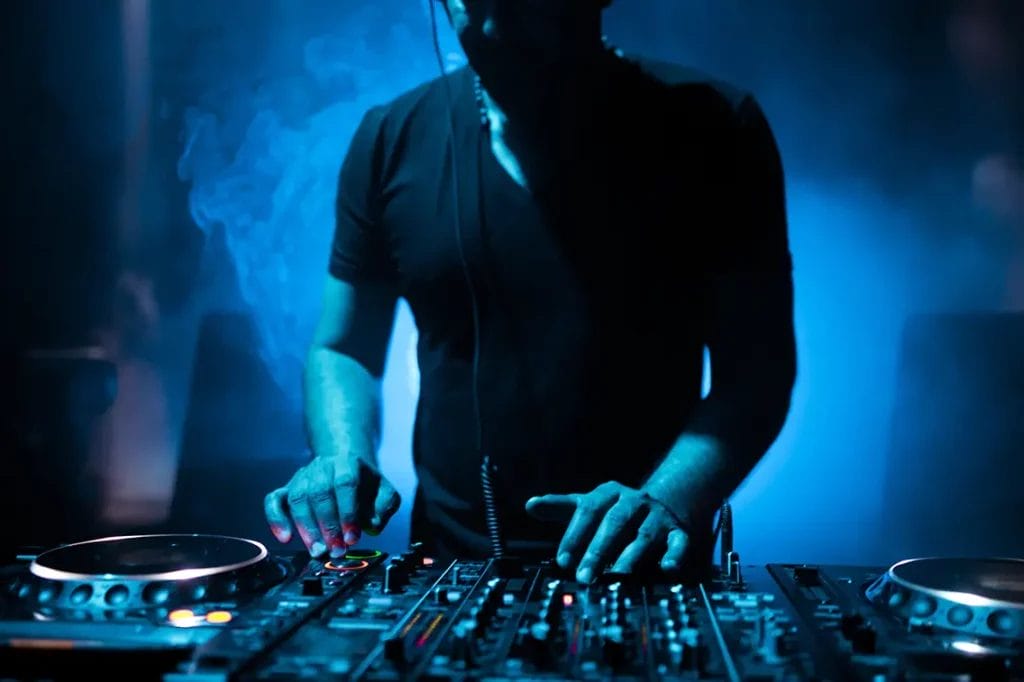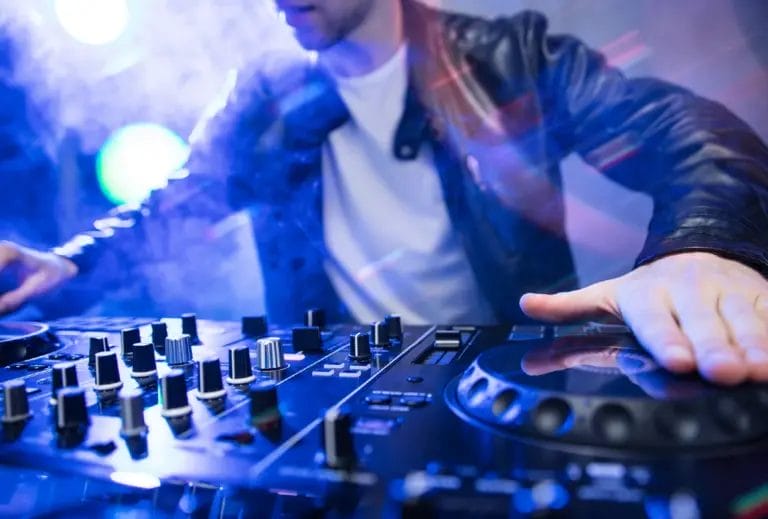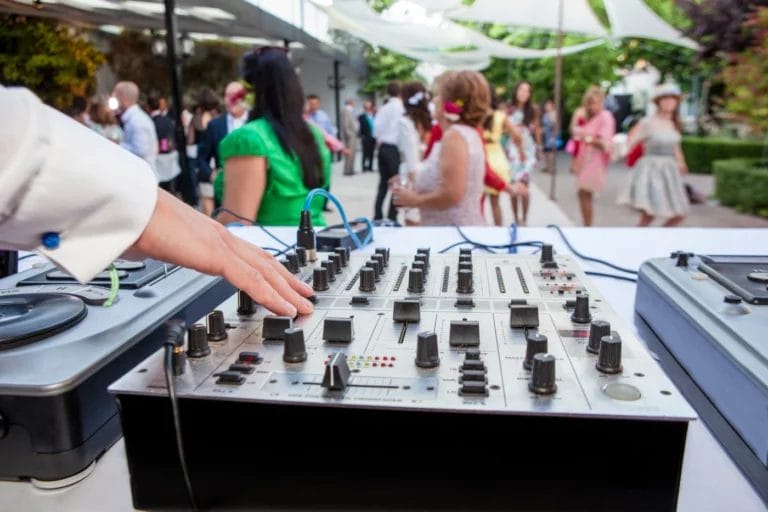If you’re just starting your DJ career but don’t know what kind of DJ you want to be, this blog is for you. There are several different types of DJs and several different paths your DJ business can follow.
DJs can take a party or event to a whole new level. Your music can help create memories and really have an impact on not just your booked gig but also the music industry. Never underestimate your talents or passion for your music.
Different Types Of DJs
1. Club
Club DJs perform at nightclubs and bars. Club DJs may have one of the hardest jobs because it’s up to them to keep the party going. This means reading the room and adjusting the music to fit the crowd. Club DJs are well-versed in a variety of music genres and styles.
It is common for Club DJs to get paid per event or per month if they sign a residency with the club.
2. Radio
There are three types of Radio DJs: On-Air Personality, Music Selector, and Show Host.
On-Air Personality DJs conduct interviews, video streams, and on-air radio shows. Music selectors are responsible for curating the music that plays on a particular radio station.
Show Hosts conduct on-air radio shows. Topics can range from politics, pop culture, and other curated content.
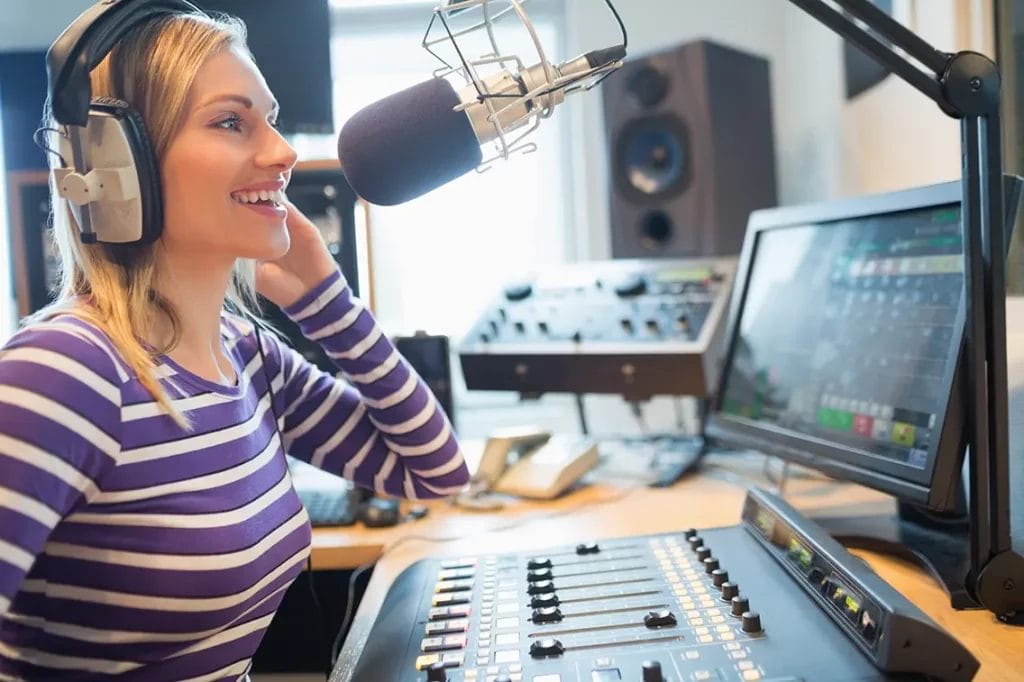
3. Genre
Types of DJs can also be classified based on the type of music and style they play. The term “genre” refers to a specific category or classification of music characterized by certain musical elements, rhythms, melodies, and instrumentation.
Here are some common DJ genres:
- House DJ: House DJs often play tracks with a consistent tempo, creating an energetic and danceable vibe. Subgenres within House include Deep House, Tech House, and Progressive House.
- Dubstep DJ: Dubstep is characterized by its heavy basslines, syncopated rhythms, and use of electronic effects. Dubstep DJs create a dynamic and often intense sound, appealing to fans of electronic and bass-heavy music.
- Hip-Hop DJ: Hip-hop DJs play tracks from the hip-hop genre, which includes rap vocals, rhythm-driven beats, and a focus on lyricism. They may also incorporate scratching and turntable techniques into their performances.
- EDM DJ: Electronic Dance Music (EDM) is an umbrella term that covers various electronic music genres, including House, Trance, Dubstep, and more. EDM DJs often create high-energy sets with a mix of different electronic styles.
- Reggae/Dancehall DJ: Reggae and Dancehall DJs specialize in playing tracks from these Jamaican genres, known for their laid-back rhythms, distinctive vocal styles, and socially conscious lyrics.
These are just a few examples of the many genres DJs can specialize in. Many DJs incorporate elements from multiple genres into their sets, allowing for more creative exploration and the development of unique styles that appeal to a wide variety of audiences.
4. Mobile
Mobile DJs provide their DJ skills to a variety of locations and events. They often travel with their own equipment. Mobile DJs are more versatile and can bring their music and performance to different settings.
Here’s a closer look at what a Mobile DJ does:
- Event Variety: Mobile DJs cater to a wide range of events, such as weddings, birthday parties, corporate events, school dances, private gatherings, and more. They adjust their music and performance style to suit the specific needs and preferences of the event and audience.
- Equipment: Mobile DJs typically have their own portable sound systems, lighting setups, and other equipment needed for their performances. This mobility allows them to set up and book gigs at various venues, both indoors and outdoors.
- Music Selection: A Mobile DJ curates playlists and selects music to match the theme, atmosphere, and demographic of the event.
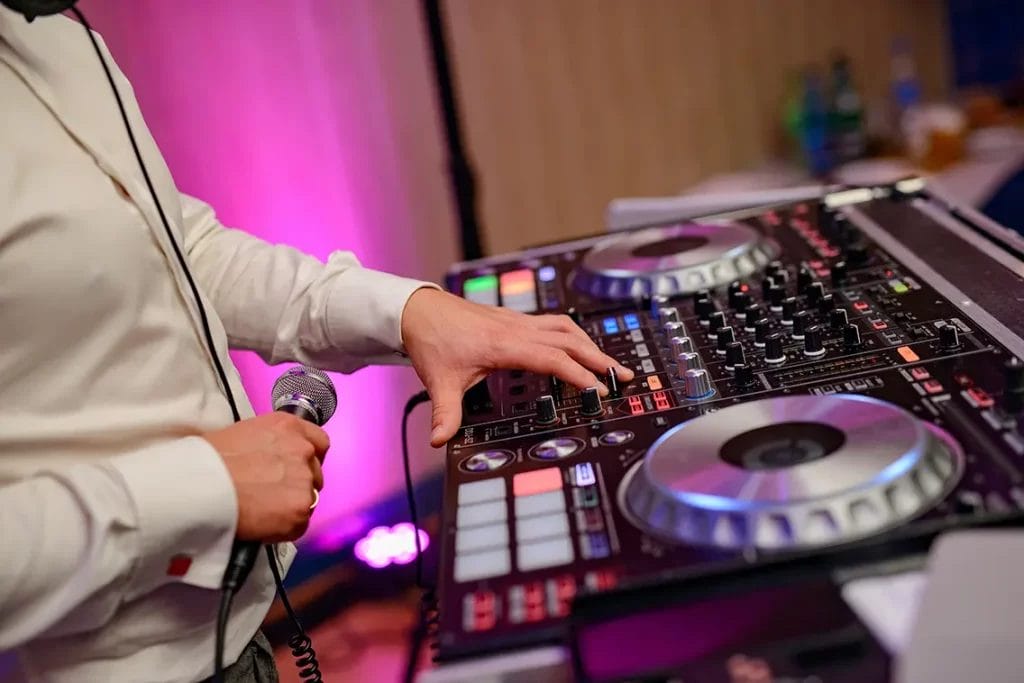
5. Wedding
A Wedding DJ’s role is to create a memorable and enjoyable musical experience for the couple and their guests during the wedding festivities. Wedding DJs play a crucial role in setting the tone and atmosphere of the wedding celebration.
Here’s some more info on what a Wedding DJ does:
- Ceremony & Reception Music: A Wedding DJ can provide music for various parts of the wedding ceremony, including the prelude, processional, and recessional. The reception is where a Wedding DJ’s role is most prominent. They curate playlists and select music to match different phases of the reception. They aim to keep the dance floor energetic and lively by playing a mix of songs.
- Emceeing: Wedding DJs often serve as emcees, making announcements and guiding the flow of the reception. They introduce the newlyweds, announce special dances or toasts, and keep guests informed about upcoming events during the reception.
- Reading the Crowd: A skilled Wedding DJ is adept at reading the crowd and adjusting the music selection accordingly. They pay attention to the energy on the dance floor and make real-time decisions about which songs to play to keep the party going.
- Equipment: Wedding DJs bring their own sound systems, microphones, and lighting setups to ensure that the audio and visual aspects of the event are of high quality. They are responsible for setting up and testing the equipment before the event begins.
6. Bedroom
A Bedroom DJ practices and performs the art of DJing as a hobby or personal interest, often within their own bedroom or home setup. Bedroom DJs focus on improving their skills, experimenting with music, and mixing tracks for their own enjoyment.
Here are some key aspects of a bedroom DJ:
- Amateur Enthusiast: Bedroom DJs are typically not pursuing DJing as a career or professional endeavor. Instead, DJing is a creative outlet and a way for them to connect with music on a personal level.
- Practice and Experimentation: Bedroom DJs spend time honing their mixing techniques, and beat-matching skills, and exploring different genres of music. They experiment with transitions, effects, and creative mixing styles to develop their own unique sound.
- Creative Freedom: Since Bedroom DJs are not performing for a live audience, they have the freedom to explore and experiment without the pressure of a paying gig.
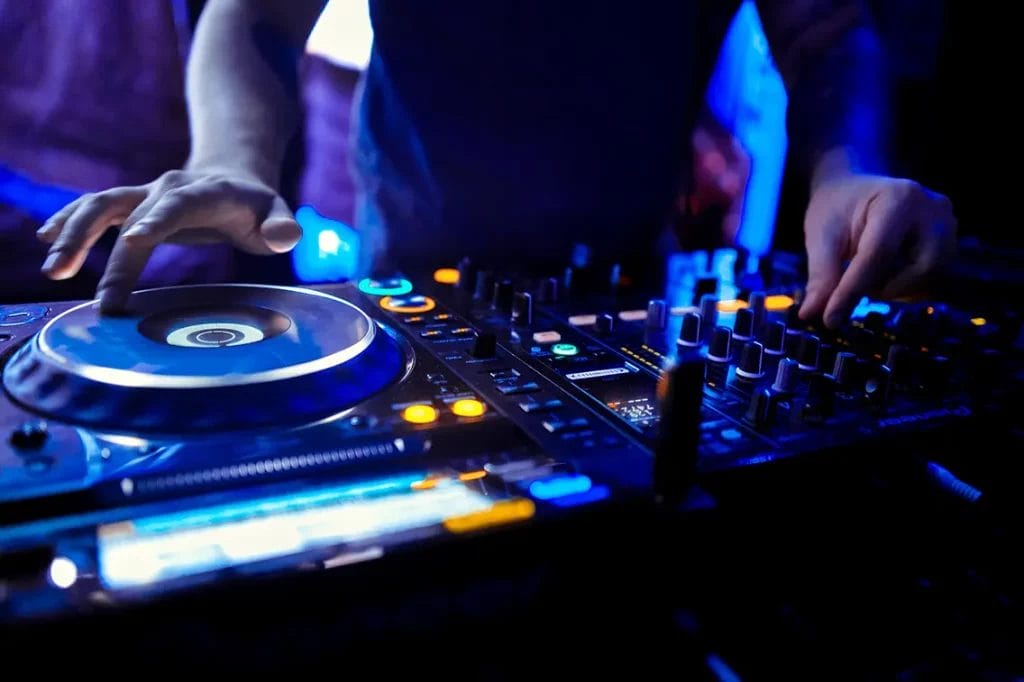
7. Turntablist
A Turntablist DJ specializes in using vinyl records, turntables, and various techniques to create rhythmic patterns, scratches, and sound effects. Turntablism is considered a form of art that involves manipulating records and turntables in unique and innovative ways to produce music and sound compositions.
Here’s an overview of what a Turntablist DJ does:
- Scratching and Manipulation: Turntablists use the techniques of scratching, beat juggling, and sound manipulation to create intricate and rhythmic patterns.
- Vinyl Records: Turntablists primarily work with vinyl records. They select specific records that contain sounds, beats, and samples suitable for their creative purposes.
- Mixer and Crossfader: Turntablists can use a mixer with a crossfader, which allows them to control the audio output from two different turntables. This enables them to transition between records, scratch, and create complex rhythms.
8. Resident
A Resident DJ holds a regular and ongoing position at a specific venue or establishment. Resident DJs are a consistent part of the entertainment lineup at a particular club, bar, lounge, or other entertainment venue.
Here’s some more info on Resident DJs:
- Regular Performances: Resident DJs have a set schedule of performances at the venue where they are employed. This could be a weekly, bi-weekly, or monthly arrangement.
- Familiarity with Venue: Resident DJs become intimately familiar with the venue’s layout, acoustics, sound system, and crowd dynamics. This familiarity allows them to tailor their sets to the specific atmosphere of the venue.
- Creating an Atmosphere: Resident DJs play a crucial role in creating and maintaining the desired atmosphere or vibe of the venue. They adapt their music selection and mixing style to suit the venue’s brand and the preferences of the regular patrons.
- Building a Following: Resident DJs can build a dedicated following of fans who return to the venue specifically to hear them play. Their consistent presence contributes to the overall identity and reputation of the venue.
Read our quick DJ license guide to find out out if you need one for your gigs.
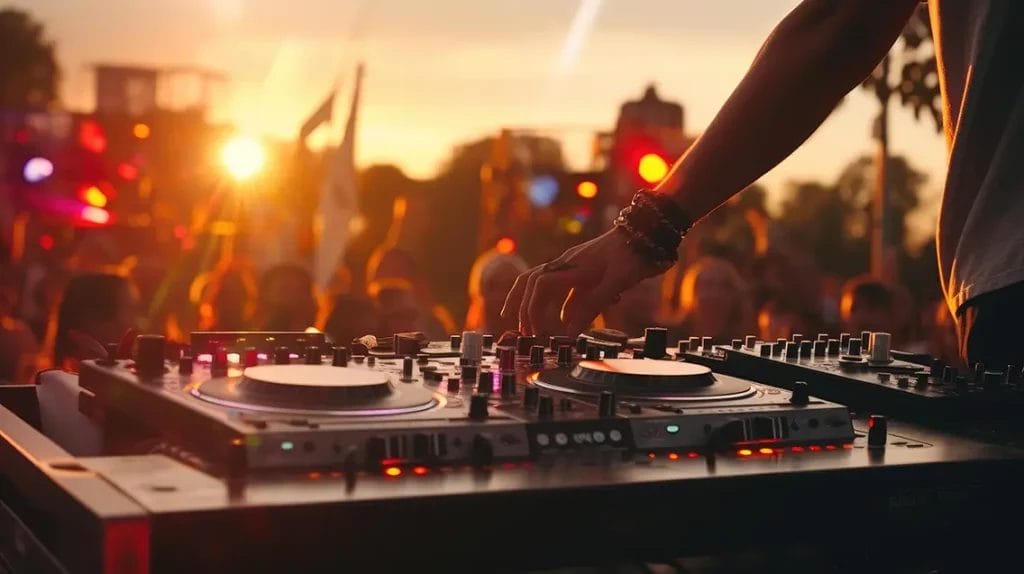
How To Choose The Best DJ Path For Your Business
We understand that the types of DJs can be a bit overwhelming. There are so many options. Instead of feeling overwhelmed, look at all of the possibilities! The sky is the limit and we have a feeling you’re going to have a really great DJ career.
That leads us to how to choose the best path for your DJ business. Consider the following:
- Do you like performing at different gigs or do you want more stability?
- What kind of equipment do you prefer?
- How much creative freedom do you want?
- What type of DJ genre is your favorite?
Your answers to these questions can help lead you to the best DJ path for your business. Check out our blog on how to get your DJ business started if you’re looking to learn more information.
How To Protect Your DJ Business
Let’s take a moment to learn more about how you can protect your DJing business.
Believe it or not, you can protect your business for as little as $18.50 per month with DJ insurance. As a DJ, you are vulnerable to several different risks. These risks can include guest injuries, equipment damage, and property damage. Unfortunately, these risks can cost your business thousands of dollars out-of-pocket.
DJ insurance can protect you from these costs and even help you book gigs and events.
Interested? Check out our DJ policy today!

